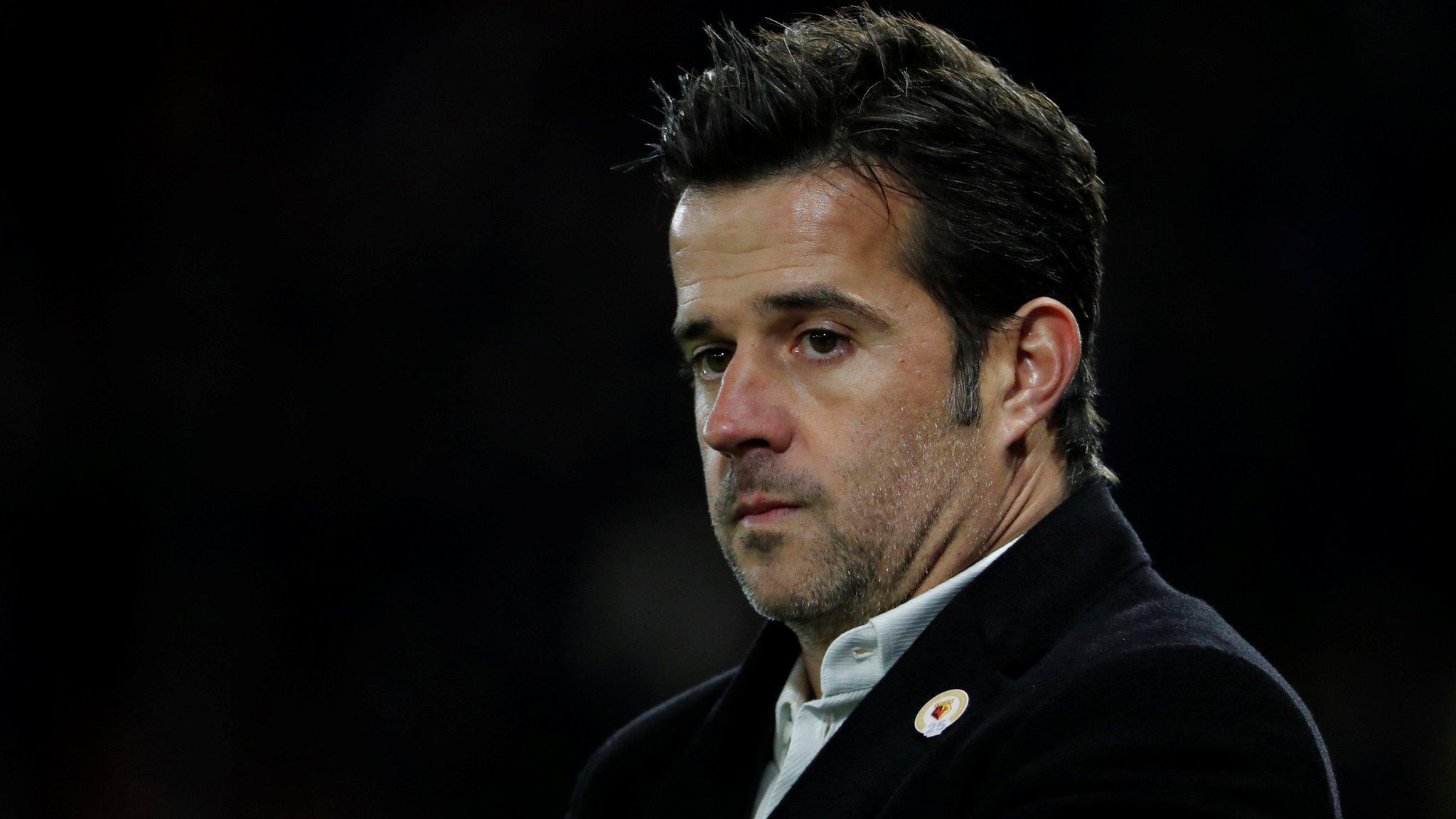Premier League: Does sacking a manager in October or November work?
- Published
- comments

Five Premier League managers have lost their jobs this season, including Slaven Bilic, Tony Pulis and Ronald Koeman
The international break that straddles October and November - the sacking season, a time for managers to be fearful.
At least so the theory goes. Enough matches have been played for owners to be sufficiently concerned by poor starts, while the two-week break gives a rare window to find a suitable replacement.
Four Premier League managers lost their jobs during those months this season - Craig Shakespeare (Leicester), Ronald Koeman (Everton), Slaven Bilic (West Ham) and Tony Pulis (West Brom) - taking the overall 2017-18 tally to five.
But is there really increased managerial upheaval at this time of the year? And does making a change work? We've assessed some of the numbers to find out.
Does changing manager at this time of year work?
We've looked back at the past 10 Premier League seasons and, remarkably, in all but one instance where a club sacked a manager (or he resigned after poor performance) during October and November, their average points-per-game return increased over the remainder of the season.
Excluding this year, that's 10 sackings/resignations during that two-month period, nine with an ultimately positive impact.
Even at Aston Villa in 2015-16 - the third-worst campaign in Premier League history - sacking Tim Sherwood and replacing him with Remi Garde led to a small improvement.
Garde left with a 10% win return - the lowest of any Premier League manager - but his two victories from 20 top-flight games at least helped the club improve from a record of 0.4 points per game under Sherwood to 0.46 after he left.
The one instance where a change did not lead to an improvement came in 2009-10 when Avram Grant replaced Paul Hart at Portsmouth. They managed just 12 points from their final 27 games. Relegation soon followed.
Even in that instance, though, there was no adverse impact on their league position - Grant took over with Portsmouth 20th and that is where they finished.
And interestingly, no club that has sacked their manager in October or November during the past decade has gone on to finish lower than their position at the time of the dismissal.
In the past 10 seasons, no team has dropped down the table after changing their manager in October/November because of poor performance | |||||
|---|---|---|---|---|---|
Manager sacked | Replaced by | Club | Season | Position at time of sacking | Position at end of season |
Juande Ramos | Harry Redknapp | Tottenham | 2008-09 | 20th | 8th |
Paul Hart | Avram Grant | Portsmouth | 2009-10 | 20th | 20th |
Steve Bruce | Martin 0'Neill | Sunderland | 2011-12 | 16th | 13th |
Roberto Di Matteo | Rafael Benitez | Chelsea | 2012-13 | 3rd | 3rd |
Mark Hughes | Harry Redknapp | QPR | 2012-13 | 20th | 20th |
Ian Holloway | Tony Pulis | Crystal Palace | 2013-14 | 19th | 11th |
Brendan Rodgers | Jurgen Klopp | Liverpool | 2015-16 | 10th | 8th |
Dick Advocaat | Sam Allardyce | Sunderland | 2015-16 | 19th | 17th |
Tim Sherwood | Remi Garde | Aston Villa | 2015-16 | 20th | 20th |
Francesco Guidolin | Paul Clement | Swansea | 2016-17 | 17th | 15th |
You will not be surprised that the two incoming managers to have made the biggest impact at this time of year are Tony Pulis, who improved Crystal Palace by 1.02 points per game in 2013-14, and Sam Allardyce, who steered Sunderland to safety with an upturn of 0.82 points per game in 2015-16.
It is no surprise, then, that Allardyce has been linked with Everton in recent weeks.
As for Pulis, maybe West Brom need to rehire him, as Match of the Day presenter Gary Lineker suggested...

Has this been a particularly sack-heavy start to the season?
A quarter of Premier League clubs have changed their manager already this season, with only 12 matches played.
That's five gone - all sacked. Some kind of record, surely?
Perhaps surprisingly, it registers as only the fourth worst season for managers at this stage of a campaign in Premier League history.
But it is the worst in the past decade.
With a week to go until November is out, there is still time for 2017-18 to break this particular Premier League record.
Is this really 'the sacking season'?
November has actually been a relatively quiet month for sackings over the past 10 seasons.
In fact, the dismissals of Pulis and Bilic make up 33% of all managerial changes during this month over the past decade.
While summer is the obvious time for change, it seems owners get particularly twitchy during December. It is probably no surprise that the three busiest months for managers leaving their jobs are May, June and December - three months when an upcoming transfer window will be at the forefront of clubs' minds.
Are sackings on the rise?
Only once in the past decade have managerial changes in the Premier League not reached double figures - the nine made in 2009-10 a relatively low figure.
That was also an unusual campaign as just five of those changes were made during the season itself, with the other four coming after the final game.
The 2008-09 campaign remains the worst for managerial stability from our 10-year sample period, with 14 changes in all by nine different clubs.
If 2017-18 is to reach that level, another nine managers would have to leave their jobs.
- Published22 November 2017
